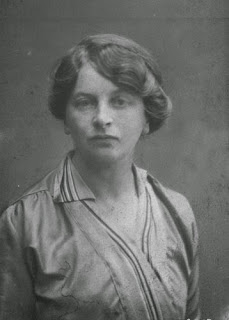Inessa Fyodorovna Armand (born Elisabeth-Inès Stéphane d'Herbenville; May 8, 1874 â€" September 24, 1920) was a French-Russian communist politician and member of the Bolsheviks who spent most of her life in Russia.
Biography

Armand was born in Paris. Her mother, Nathalie Wild, was a comedian of half-French and half-English descent, and her father, Théodore Pécheux d'Herbenville, was a French opera-singer. Her father died when she was five and she was brought up by her aunt and grandmother living in Moscow, both teachers.
At the age of nineteen she married Alexander Armand, the son of a wealthy Russian textile manufacturer. The marriage produced four children. Inessa and her husband opened a school for peasant children outside of Moscow. She also joined a charitable group dedicated to helping the city's destitute women.
In 1903 she joined the illegal Russian Social Democratic Labour Party. Armand distributed illegal propaganda; after her arrest in June 1907 she was sentenced to two years' internal exile in Mezen in Northern Russia.
In November 1908 Armand managed to escape from Mezen and eventually left Russia to settle in Paris, where she met Vladimir Lenin and other Bolsheviks living in foreign exile. In 1911 Armand became secretary for the Committee of Foreign Organisations established to coordinate all Bolshevik groups in Western Europe.
Armand returned to Russia in July 1912, to help organise the Bolshevik campaign to get its supporters elected to the Duma. Two months later she was arrested and imprisoned, only to be released against bail in March 1913. Once again illegally leaving Russia, she went to live with Vladimir Lenin and Nadezhda Krupskaya in Galicia. She also began work editing Rabotnitsa.
Armand was upset that many socialists in Europe chose not to fight against the war effort during World War I. She joined Lenin in helping to distribute propaganda that urged Allied troops to turn their rifles against their officers and to start a socialist revolution. In March 1915 Armand went to Switzerland where she organised the anti-war International Conference of Socialist Women.
On 2 March 1917 Tsar Nicholas II abdicated, leaving the Provisional Government in control of the country. The Bolsheviks in exile became desperate to return to Russia to help shape the future of the country. The German Foreign Ministry, which hoped that Bolshevik influence in Russia would help bring the war on the Eastern Front to an end, provided a special train for Armand, Vladimir Lenin and 26 other revolutionaries to travel to Petrograd.
After the October Revolution Armand served as an executive member of the Moscow Soviet. She became a staunch critic of the Soviet government's decision to sign the Treaty of Brest-Litovsk. On her return to Petrograd, she became director of Zhenotdel, an organisation that fought for female equality in the Communist Party and the Soviet trade unions. (Zhenotdel operated until 1930.) Armand also chaired the First International Conference of Communist Women in 1920. The spring of 1920 saw the appearance, again on Armand’s initiative, of the journal Kommunistka, which dealt with "the broader aspects of female emancipation and the need to alter the relationship between the sexes if lasting change was to be effected".
But the fifth number of this journal carried its founder’s obituary. While she was on a holiday in the Caucasus she contracted cholera and died at the age of forty-six. She was buried in the Kremlin Wall Necropolis in Moscow.
Armand has been portrayed in the films Lenin in Paris (1981, played by Claude Jade), Lenin: The Train (1988, played by Dominique Sanda) and All My Lenins (1997, played by Janne Sevchenko). She was also portrayed as the heroine in the fictionalised account of Lenin's Russian return: Seven Days to Petrograd (1988 by Tom Hyman, Penguin Books).
References

Further reading

- Elwood, Ralph Carter. Vserossiiskaya Konferentsiya Ros. Sots. -Dem. Rab. Partii 1912 Goda: All-Russian Conference of the Russian Social-Democratic Labour Party 1912. Together With Izveschenie O Konferentsii Organizatsii RSDRP. Publications of the Study Group on the Russian Revolution 4. Millwood, NY: Kraus International Publications, 1982.
- Elwood, Ralph Carter. Inessa Armand: Revolutionary and Feminist. Cambridge and New York: Cambridge University Press, 1992.
- Pearson, Michael. The Sealed Train. New York: Putnam, 1975.
- Pearson, Michael. Lenin's Mistress: The Life of Inessa Armand. New York: Random House, 2002.
- Wolfe, Bertram D. "Lenin and Inessa Armand," Slavic Review, vol. 22, no. 1 (March 1963), pp. 96â€"114. In JSTOR.

